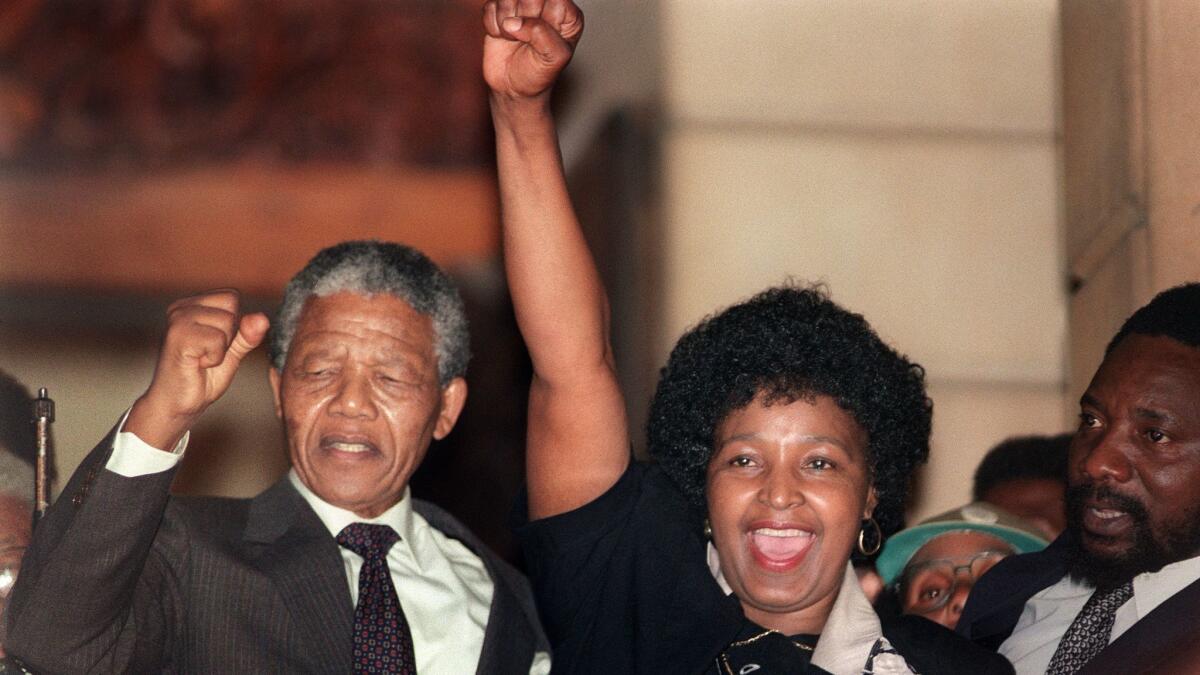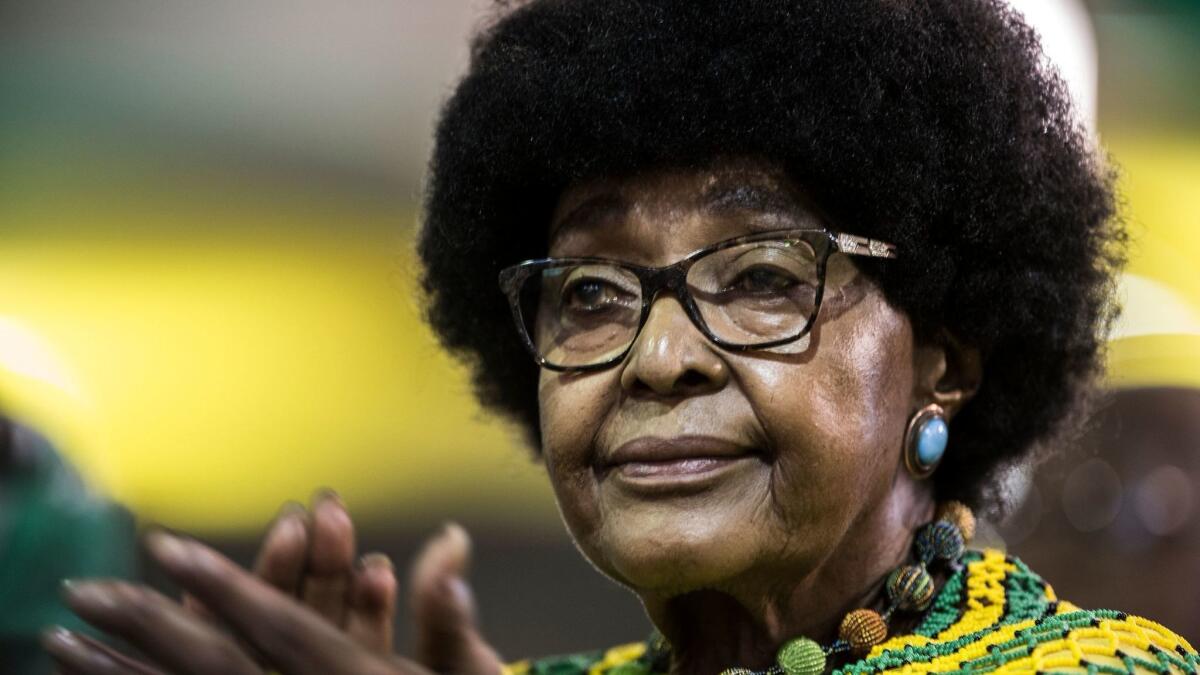Winnie Madikizela-Mandela, anti-apartheid activist and âMother of the Nation,â dies at 81

Reporting from Johannesburg, South Africa â Winnie Madikizela-Mandela, the former wife of Nelson Mandela who died in Johannesburg on Monday, was revered by many in South Africa as the âMother of the Nation,â but criticized by others over a brutal apartheid-era killing by her thuggish bodyguards.
A contentious figure dogged by controversy, she was also a prominent anti-apartheid activist and politician. Madikizela-Mandela died in a hospital after being admitted with a kidney infection. She was 81.
Born in the village of Bizana in the Eastern Cape to parents who were teachers, she moved to Johannesburg and graduated from college as a social worker. She married Mandela in 1958, six years before he was sentenced to life imprisonment for treason.
She campaigned relentlessly for Mandelaâs release during his 27-year imprisonment, raised two daughters alone, faced harassment by South African security forces and served more than a year in prison, including time in solitary confinement, after being arrested by security police in 1969 in front of her children for violations of the Terrorism Act.
A prominent face of the liberation struggle to overturn the apartheid system of officially mandated racial segregation, she was âbannedâ by the government in 1962, a designation that barred her from giving interviews or attending meetings for 13 years. In 1977, she was banished to the town of Brandt in what was then the Orange Free State, and denied permission to leave. Her house was firebombed twice. In 1985 she defied the apartheid regime and returned home to Soweto, the black township outside Johannesburg.
FROM THE ARCHIVES: Winnie Mandela Defies Ban, Is Pulled From Home »
Madikizela-Mandela called herself the âgrandmother of Africaâ and once told an interviewer, âMy continent knows more about me than I do myself.â In 2016, the ANC called her âa fearless freedom fighter, stalwart of our movement and mother of the nation.â Last year then-President Jacob Zuma bestowed on her the nationâs highest honor, the Order of Luthuli.
A family statement released Monday called Madikizela-Mandela âone of the greatest icons of the struggle against apartheid.â
But she left a contentious legacy because of her bodyguardsâ role in the killing of a teenage boy, as well as her support for ânecklacing,â a gruesome practice in which anti-apartheid activists would fasten tires filled with gasoline around the necks of suspected informers, and set them alight.
âWith our necklaces and our boxes of matches we will liberate this country,â she said in a 1986 speech.
More controversial was her alleged role in the death of 14-year-old Stompie Moeketsi, also known as Stompie Seipei, in 1989. The teen was abducted by her bodyguards, named the Mandela United Football Club, from the home of Methodist Minister Paul Verren in Soweto. The boy was beaten for days and slain using a pair of garden shears because he was suspected of being an informer.
Winnie Mandela was charged in his death but was convicted only of abduction and being an accessory to assault and was sentenced to six yearsâ imprisonment. She appealed and had the accessory charge dismissed. Her sentence was reduced to a fine.

But the case came up again in 1997 during deliberations by South Africaâs Truth and Reconciliation Commission, led by then-Anglican Archbishop Desmond Tutu, when her chief bodyguard, the âcoachâ of the football club, Jerry Richardson, who was convicted of the boyâs murder, admitted he killed Moeketsi but said it was on Madikizela-Mandelaâs orders.
She denied any role while acknowledging that âthings went horribly wrong.â The commission report said various versions had implicated her in the boyâs murder or its attempted cover-up.
âThe Commission has not been able to establish conclusively the veracity of any of these versions. Ms. Madikizela-Mandelaâs testimony before the Commission was characterized by a blanket denial of all allegations against her. It was onlyâ¦under great pressure from Archbishop Desmond Tutu that she reluctantly conceded that âthings had gone horribly wrong,ââ the report said.
In 1992, shortly after his release from prison, Mandela announced that he was separating from his wife âin view of the tensions that have arisen owing to differences between ourselves on a number of issues in recent months.â He dropped her from his Cabinet as deputy minister for arts, culture, science and technology in 1995 after allegations of corruption and divorced her in 1996.
In 2003, she was convicted of fraud while serving as an African National Congress lawmaker. She and her financial advisor, Addy Moolman, were convicted of writing fraudulent letters to obtain bank loans for nonexistent clients.
Initially sentenced to five years in prison, she appealed and was given a three-year suspended prison sentence, avoiding confinement.
In 2010 she gave an interview to the Pakistani journalist Nadira Naipaul, in which she was quoted accusing Mandela of letting down black South Africans and criticizing him for accepting the 1993 Nobel Peace Prize alongside the white National Party leader F.W. De Klerk.
âMandela let us down. He agreed to a bad deal for the blacks. Economically, we are still on the outside. The economy is very much white. It has a few token blacks, but so many who gave their life in the struggle have died unrewarded,â she was quoted as saying. She also said that Mandela was nothing more than a âcorporation foundation. He is wheeled out globally to collect the money and he is content doing that.â
Photographs of Naipaul and her husband, the Nobel Prize-winning writer V.S. Naipaul, with Madikizela-Mandela were published with the article, which appeared in the London Evening Standard, but Madikizela-Mandela denied the interview ever took place.
Toward the end of his life, as Mandelaâs health grew poor, Madikizela-Mandela visited him often.
After Mandelaâs death in 2013, Madikizela-Mandela contested his will, in which he left his ancestral home in Qunu in the Eastern Cape to the Nelson Mandela Family Trust for the use of his children and his wife Graca Machel.
Madikizela-Mandela claimed the property was hers, and that she remained married to him under customary law despite the 1996 civil divorce. The Supreme Court of Appeal denied her claim in January after a lengthy court battle.
After her death Monday, supporters gathered outside her home in Soweto to remember her.
Tutu paid tribute to her contribution in a statement.
âShe refused to be bowed by the imprisonment of her husbandâ the perpetual harassment of her family by security forcesâ detentionsâ bannings and banishment. Her courageous defiance was deeply inspirational to meâ and to generations of activists,â Tutu said.
The Nelson Mandela Foundation praised her âundying zeal and passion.â
âThe Mandela name we revere today was kept alive by her through the most difficult times. As a woman she kept the family and the hopes of all black people alive. Itâs a very sad lossâ¦.,â the foundation said in a statement.
Energy Minister Jeff Radebe called her âa colossus of the southern African political landscape. As the ANC, we dip our revolutionary banner in salute of this great icon of our liberation struggle.â
Madikizela-Mandela was active in politics until the end of her life and recently took part in a drive to encourage ANC voters to register to vote in elections next year.
She was recently admitted to a hospital in Johannesburg for a kidney infection but had been ill for some years. She had been in and out of the hospital since the start of the year, her family said, adding that she died in the early hours of the morning surrounded by her family.
Twitter: @RobynDixon_LAT
UPDATES:
11:55 a.m.: This article has been updated throughout with background, quotes, reaction.
This article was originally posted at 7:30 a.m.
More to Read
Sign up for Essential California
The most important California stories and recommendations in your inbox every morning.
You may occasionally receive promotional content from the Los Angeles Times.










